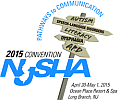Evidence Based Treatment Resources for Neurogenic Communication Disorders
Friday, 1:00pm to 3:00pm
Monmouth 2
Session 45
Evidence-based clinical practice involves the blending of clinical expertise, patient values and current best research evidence. Clinicians report that the greatest challenge in implementing evidence based practice is remaining abreast of the current best clinical evidence. Therefore several efforts have been initiated to accumulate clinical evidence in the form of systematic reviews of the treatment literature.This session will highlight resources available to support evidence-based clinical practice. The presenter will discuss methods that should be used in conducting unbiased, high-quality systematic reviews. As well as review recent reviews of contrasting methods used in aphasia treatment, direct restorative treatment in the form of constraint-induced language treatment (Cherney et al., 2011), and a compensatory treatment for aphasia in the form of communication partner training (Simmons-Mackie et al., 2010; Cherney et al., in press), and treatment for cognitive-communication impairments in dementia. The results of those systematic reviews will be presented with an examination of the quality of methods used in those reviews and conclusions that can be drawn to improve clinical practice for our patients with aphasia and dementia.
Track:
Adult
